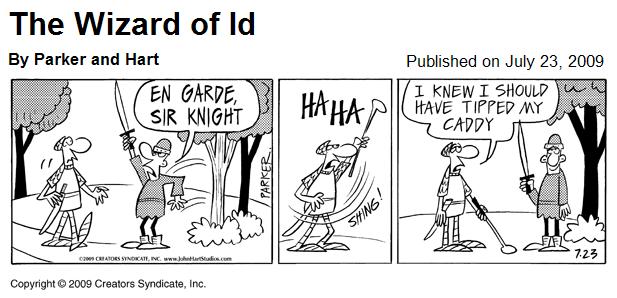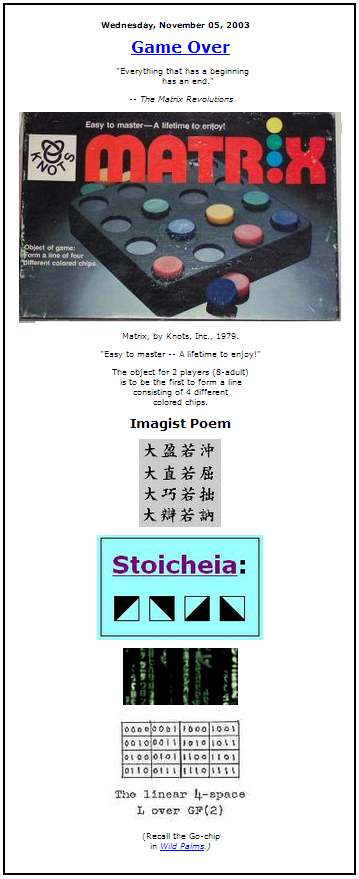See "The Batty Farewell" (yesterday's eulogy for Rutger Hauer) and . . .

Click the above fake seal for a related story.
See "The Batty Farewell" (yesterday's eulogy for Rutger Hauer) and . . .

Click the above fake seal for a related story.
Adam Rogers today on "Rutger Hauer in Blade Runner , playing
the artificial* person Roy Batty in his death scene."
* See the word "Artifice" in this journal,
as well as Tears in Rain . . .

Harrison Ford in "Blade Runner 2049" —
Click the above quote for a scholium.
See also the previous post and . . .
"Prodigal Son" scene in Blade Runner .
Click for related news.
"Nothing the god of biomechanics wouldn't let you in heaven for."
Top of the front page, tonight's online New York Times—
Click the above image for the story of a rather different cyclist.
See also some images from Guy Fawkes Day, 2003—

Related material:
Blade Runner in this journal and posts tagged "Fawkes"—
"Eighteenth century theories of language were often presented as genealogies; instead of looking to the functions or operations of language to describe its 'nature,' they appealed to the story of its origins (with more or less literalist intentions.) The interest in an original 'revealed' language began much earlier, however. Leibniz, for example, searched for a primitive root-language which he felt could be discovered through research into etymology, and asserted that this ur-text, whether its signifiers were natural or conventional, would be composed of rational relations worthy of its original author, or Author, that is, God. He also toyed with the notion that hieroglyphics might be a philosophical language, a kind of meaningful mathematics, whose revelations would be exact and necessary. The debate over the origins of language— and the status of hieroglyphics— as it played out in the eighteenth century was linked to a dispute over metaphor, conceived as a 'primitive' mode of expression which preceded and was less nuanced and precise than the 'arbitrary' modern European languages. What is essential here is not the specifics of the debate on the origins of language (although this would certainly add much to the present inquiry) but rather the link that was thus constituted between hieroglyphics, the primitive ('the savage and the poet speak only in hieroglyphics') and the idea of an archaic language as an original archive of meanings which pre-exists Man and his derivative or arbitrary tongues."
— "This Extreme and Difficult Sense of Spectacular Representation: Antonin Artaud's Ontology of 'Live'," by Deborah Levitt
^
"In several programming languages, such as C, C++, C#, Java, Perl, and Python, a caret (^) is used to denote the bitwise XOR operator. This is not used outside of programming contexts because it is too easily confused with other uses of the caret." —Wikipedia article on Exclusive Or
See also the above date, July 7, 2010, in this journal.

Philip K. Dick, author of the novel
on which the Harrison Ford film
"Blade Runner" (1982) was based.
"You'd never know it, but buddy
I'm a kind of poet."
On Chris Hipp, who died of an apparent heart attack at 47 on July 14 (Bastille Day), 2009:
“‘He was the father of blade technology when he was with RLX,’ Jim Hall, president of the Blade System Alliance, said in an interview. ‘He invented the blade server.'”
“Hall said Hipp was a natural inventor who wanted to be on the cutting edge.”
— Jeffrey Burt at eWeek.com
Epitaph by a friend:
“He was known as a determined, fearsome and fair competitor.”
Hipp’s motto was “pounding idiots.”*
From a website celebrating the life and family (cf. previous two entries) of Leonard Shlain, author of Art & Physics and pioneering surgeon:
“Shlain n: unique last name of Russian origins. Possible meanings: 1: Sound sword makes as it’s pulled from sheath” —Shlain.com
A more authentic sound:
“The blade actually does sing. When it is withdrawn from the sheath it makes a ‘Tshuiiing’ sound as one hears in the movies. It rings like a bell.”

Steel Addiction, Custom Knives
A less authentic sound:

* The residents of Id (as in the above cartoon) are known, affectionately, as Idiots.
— The missing last words
of Inman in Cold Mountain,
added here on the
Feast of St. Luke, 2004
7: In that night did God appear unto Solomon, and said unto him, Ask what I shall give thee.
8: And Solomon said unto God, Thou hast shewed great mercy unto David my father, and hast made me to reign in his stead.
9: Now, O LORD God, let thy promise unto David my father be established: for thou hast made me king over a people like the dust of the earth in multitude.
10: Give me now wisdom and knowledge, that I may go out and come in before this people: for who can judge this thy people, that is so great?
"At 42– a professor with no museum experience– he was named curator of painting and sculpture at the Museum of Modern Art. It was, and is, the most influential job in the fluid, insular, fiercely contentious world of modern art. Just two decades past his last Amherst game, the lineman from Savannah was sitting in the chair where the most critical decisions in his profession are made– 'the conscientious, continuous, resolute distinction of quality from mediocrity,' according to his Olympian predecessor Alfred Barr. The Modern and its chief curator serve the American art establishment as a kind of aesthetic Supreme Court, and most of their rulings are beyond appeal."
On Quality
Varnedoe, in his final
Mellon lecture at
the National Gallery,
quoted "Blade Runner"–
"I've seen things
you people wouldn't believe….
"Frank Rich of The New York Times
on the United States of America:
"A country where
entertainment is god."
Rich's description may or may not
be true of the United States, but
it certainly seems true of
The New York Times:
Click on image to enlarge.
Related material:
"Definitive"
— The New York Times,
Sept. 30, 2007, on
Blade Runner:
The Final Cut
"The art historian Kirk Varnedoe died on August 14, 2003, after a long and valiant battle with cancer. He was 57. He was a faculty member in the Institute for Advanced Study’s School of Historical Studies, where he was the fourth art historian to hold this prestigious position, first held by the German Renaissance scholar Erwin Panofsky in the 1930s."
Varnedoe chose to introduce his final lecture with the less-quoted last words of the android Roy Batty (Rutger Hauer) in Ridley Scott's film Blade Runner: 'I've seen things you people wouldn't believe– attack ships on fire off the shoulder of Orion, bright as magnesium; I rode on the back decks of a blinker and watched C-beams glitter in the dark near the Tannhauser Gate. All those moments will be lost in time, like tears in the rain. Time to die.'"
Powered by WordPress